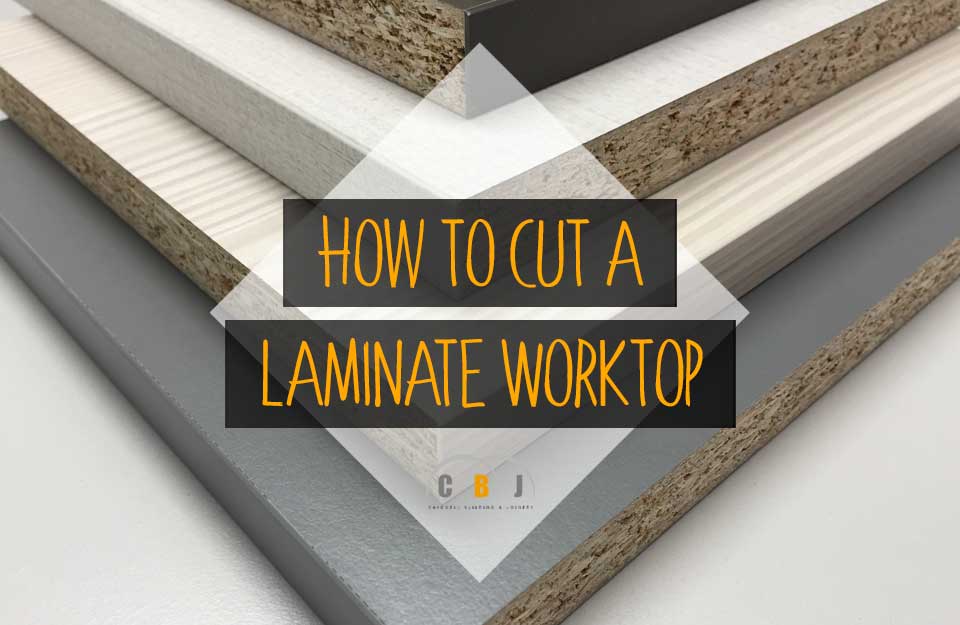News
How to Cut a Laminate Worktop
Author Chigwell Building & Joinery
Date 06/08/2023
Whether you're remodelling your kitchen or working on a DIY project, knowing how to cut a laminate worktop correctly is essential.
Laminate worktops have gained immense popularity due to their affordability, durability, and versatility.
With the right tools and techniques, you can achieve precise cuts and create seamless joints for a professional finish.
This comprehensive guide will walk you through the step-by-step process of cutting laminate worktops with precision and confidence.
Table of Contents
- What is a Laminate Worktop?
- Why Cut a Laminate Worktop?
- Tools & Materials
- What’s the Best Way to Cut a Laminate Worktop?
- Step 1: Measure & Mark
- Step 2: Secure the Worktop
- Step 3: Mark the Cut Line
- Step 4: Choose the Right Blade
- Step 5: Cutting with a Jigsaw
- Step 6: Cutting with a Circular Saw
- Step 7: Finishing Touches
- Step 8: Clean & Install
- How to Measure a Laminate Worktop
- Clear the Worktop
- Start with the Length
- Consider Overhang
- Measure the Depth
- Account for Cutouts
- Check It’s Square
- Double-Check
- Frequently Asked Questions
- Q. What’s the Best Tool to Cut Laminate Worktops?
- Q. How Do You Cut Laminate Worktops Without Chipping Them?
- Q. How Do You Seal a Laminate Worktop After Cutting?
- Tips for Cutting a Laminate Worktop
- Use the Right Tools
- Measure Twice, Cut Once
- Clamp the Worktop Securely
- Use a Guide
- Cut Slowly & Carefully
- Wipe Away Sawdust
- Inspect Your Cut
- Conclusion
What is a Laminate Worktop?
Image Credits: Pexels
A laminate worktop is a popular choice for kitchen and countertop surfaces due to its durability, affordability, and wide range of design options.
It’s made by layering multiple sheets of kraft paper impregnated with resin and bonding them under high pressure and heat.
The top layer is a decorative laminate, available in various patterns, colours, and textures, which gives the worktop its desired aesthetic.
Beneath the decorative layer is a core layer that provides structural stability, and at the bottom, there is a balancing layer that prevents warping.
Laminate worktops are known for their resistance to scratches, stains, and moisture, making them easy to clean and maintain.
In addition, they offer versatility in design, allowing homeowners to achieve the look of natural materials like wood, stone, or marble without the associated cost or maintenance requirements.
Why Cut a Laminate Worktop?
Cutting laminate worktops is often necessary during installation or renovation processes for several reasons:
Size Adjustment
Laminate worktops come in standard sizes but may need to be cut to fit specific dimensions or layouts.
Cutting allows you to customise the worktop to match the available space accurately.
Appliance Installation
When installing kitchen appliances like sinks, cooktops, or built-in ovens, you often need to create precise cutouts in the worktop to accommodate them.
These cutouts ensure a seamless fit and proper functionality of the appliances.
Corner & Joining Cuts
Laminate worktops may require cutting at corners to achieve a perfect fit in L-shaped or U-shaped kitchen layouts.
Additionally, if you have multiple worktop sections, the cutting may be necessary to create clean and tight joints between them.
Personalisation
Cutting laminate worktops can also be done for aesthetic purposes.
Consider incorporating unique design elements, such as curved edges or decorative patterns, to add a personal touch to your kitchen.
Repair & Replacement
In cases where the worktop is damaged, cutting may be necessary to remove the affected area and replace it with a new section.
This is particularly relevant for laminate worktops, as damaged portions can be replaced without refitting the entire surface.
Tools & Materials
To cut a laminate worktop, we recommend you have the following tools and materials to hand:
- Laminate worktop
- Measuring tape
- Pencil
- Jigsaw or circular saw
- Fine-toothed saw blade
- Sandpaper (medium and fine grit)
- File
- Dust mask
- Masking tape
- Safety goggles
What’s the Best Way to Cut a Laminate Worktop?
The best way to cut a laminate worktop is using a circular saw.
Follow the step-by-step guide below to know how cut a laminate worktop:
Step 1: Measure & Mark
Start by measuring the dimensions needed for your laminate worktop.
Use a measuring tape to determine the length and width of the required cuts.
Mark the measurements clearly on the surface of the laminate using a pencil.
Step 2: Secure the Worktop
Place the laminate worktop on a stable and level surface, ensuring it overhangs the edge sufficiently to accommodate the length of your cuts.
Use clamps to firmly secure the worktop, preventing it from moving during the cutting process.
Step 3: Mark the Cut Line
Draw a straight line connecting your marked measurement using a combination of squares or straightedges.
Double-check the accuracy of the line to ensure a precise cut.
If you plan to install an under-mount sink or a cooktop, account for any additional cutouts required.
Step 4: Choose the Right Blade
When cutting laminate worktops, using the correct blade is crucial.
Opt for a fine-toothed saw blade explicitly designed for melamine-faced chipboard for clean, chip-free cuts.
In addition, ensure that the blade is sharp and in good condition to avoid tearing or splintering.
Step 5: Cutting with a Jigsaw
If you're using a jigsaw, drill a hole near one end of the cut line, slightly inside the marked area.
Insert the jigsaw blade through the hole and carefully follow the marked line, applying steady and even pressure.
Take your time and let the blade do the work.
Keep the base of the jigsaw firmly against the worktop surface to prevent excessive vibrations.
Step 6: Cutting with a Circular Saw
If you prefer a circular saw, adjust the cutting depth to a slightly more pronounced position than the thickness of the laminate.
Align the saw blade with the cut line, ensuring that the edge of the base plate rests firmly against the straightedge.
Slowly guide the saw along the cut line, maintaining a steady pace to achieve a clean and accurate cut.
Step 7: Finishing Touches
After making the initial cut, you may notice some rough edges or uneven cuts.
Use sandpaper with medium grit to smoothen the edges to remove any burrs or imperfections.
Follow up with fine-grit sandpaper to achieve a smooth and polished finish.
Finally, use a file to refine the shape and remove any roughness for tight corners or curved cuts.
Step 8: Clean & Install
Once you're satisfied with the cuts and overall finish, thoroughly clean the laminate worktop to remove sawdust or debris.
Then, install the worktop, ensuring proper support and secure attachment.
How to Measure a Laminate Worktop
Image Credits: Pexels
Now that you’ve learned how to cut a laminate worktop, it's important to measure the laminate worktop accurately.
Measuring a laminate worktop correctly ensures a proper fit and successful installation.
Here's a step-by-step guide on how to measure a laminate worktop:
Clear the Worktop
Remove any items, appliances, or clutter from the laminate worktop to ensure a clear, unobstructed surface for measurement.
Start with the Length
Use a measuring tape to measure the length of the area where the worktop will be installed.
Measure from one end to the other, considering any corners, walls, or gaps where the worktop must fit.
Consider Overhang
Decide on the desired overhang of the worktop.
The standard overhang is usually around 3.8 to 5cm (1.5 to 2 inches) on the front edge of the base cabinets.
Measure the distance from the edge of the base cabinets to determine the overhang length.
Measure the Depth
Determine the depth or width of the worktop by measuring from the back wall to the front edge of the base cabinets.
Take measurements at different points along the length to account for any irregularities or wall or cabinet depth variations.
Account for Cutouts
If you need to install appliances, sinks, or cooktops within the worktop, measure the dimensions and locations of the cutouts required.
Measure each cutout's width, depth, and shape, and ensure to include these measurements in your overall worktop dimensions.
Check It’s Square
Verify if the corners and angles of the area where the worktop will be installed are square.
Use a carpenter's square or a combination square to check the right tips of the corners.
If the corners are not perfectly square, measure the lengths of the diagonals to confirm the accuracy of the measurements.
Double-Check
Before finalising the measurements, double-check all the dimensions and ensure they’re accurate and consistent.
Take additional measures if needed to ensure precision.
Frequently Asked Questions
Q. What’s the Best Tool to Cut Laminate Worktops?
The best tool is considered a circular saw with a fine-toothed blade for cutting laminate countertops.
Its adjustable depth and precise cutting capabilities are ideal for achieving clean and accurate cuts on laminate surfaces.
Q. How Do You Cut Laminate Worktops Without Chipping Them?
To cut laminate countertops without chipping, follow the below mentioned steps:
- Use a sharp blade with fine teeth on a circular saw.
- Apply painter's tape along the cutting line to reduce splintering.
- Cut the laminate from the backside to minimise chipping, and go slow to allow the blade to cut through smoothly.
Q. How Do You Seal a Laminate Worktop After Cutting?
After cutting a worktop, seal it by following these steps:
First, lightly sand the cut edges with fine-grit sandpaper to smooth them.
Clean the surface to remove dust and debris.
Apply a laminate edge banding or a clear silicone sealant to protect the edges from moisture and enhance durability.
Tips for Cutting a Laminate Worktop
Use the Right Tools
A circular saw is the best for cutting a laminate worktop, but you can also use a jigsaw or a hand saw.
Make sure the blade is sharp and the correct type of blade for the material of your worktop.
Measure Twice, Cut Once
It’s important to measure carefully before you cut.
Use a tape measure and a pencil to mark the line where you want to cut.
Clamp the Worktop Securely
This will prevent it from moving while you are cutting.
Use C-clamps or bar clamps to secure the laminate worktop to a workbench or other sturdy surface.
Use a Guide
A straightedge guide will help you to make a straight cut.
You can use a piece of plywood or a metal ruler as a guide.
Cut Slowly & Carefully
Don't try to force the saw through the worktop.
Cut slowly and carefully to avoid chipping or splintering the laminate.
Wipe Away Sawdust
As you cut, sawdust will accumulate on the worktop.
Wipe it away with a damp cloth to keep the surface clean.
Inspect Your Cut
Once you’ve finished cutting, inspect the cut to ensure it is straight and free of splinters.
If you are unhappy with the amount, you can sand it smoothly.
Conclusion
To wrap up, learning how to cut a laminate worktop is a valuable skill for any DIY enthusiast or homeowner looking to upgrade their kitchen.
Following the step-by-step guide outlined in this article, you can achieve precise and professional-looking cuts, ensuring a seamless fit for your worktops.
However, if you're not confident in your cutting abilities or prefer to leave it to the experts, Chigwell Building Joinery offers a convenient solution.
Our cut-to-size laminate board service removes the hassle, providing you with tailor-made worktops that perfectly suit your requirements.
Whether you decide to tackle the cutting yourself or opt for the professional assistance of CBJ Ltd, you can confidently transform your kitchen into a functional and visually appealing space.
So, don't hesitate to contact us and take the first step towards your dream kitchen today.


